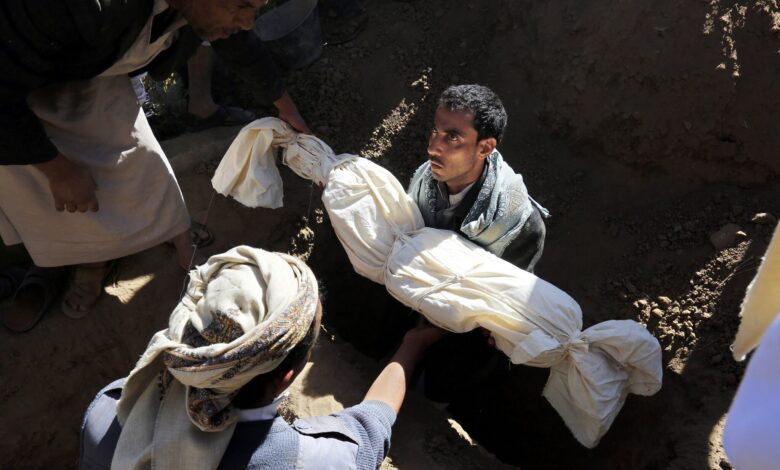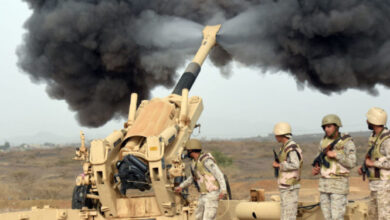War Crime Risk Grows for U.S. Over Saudi Strikes in Yemen

The civilian death toll from Saudi Arabia’s disastrous air war over Yemen was steadily rising in 2016 when the State Department’s legal office in the Obama administration reached a startling conclusion: Top American officials could be charged with war crimes for approving bomb sales to the Saudis and their partners.
Four years later, more than a dozen current and former U.S. officials say the legal risks have only grown as President Trump has made selling weapons to Saudi Arabia, the United Arab Emirates and other Middle East nations a cornerstone of his foreign policy.
Yet rather than taking steps to address the legal issues, State Department leaders have gone to great lengths to conceal them. Even after a State Department inspector general investigation this year revealed that the department had failed to address the legal risks of selling bombs to the Saudis, agency officials ensured that details of the finding were put in a classified part of the public report released in August, and then so heavily redacted that lawmakers with security clearances could not see them.
At a congressional hearing on Wednesday, Democrats on the House Foreign Affairs Committee accused the State Department’s top lawyer and the assistant secretary overseeing weapons sales of negligence on civilian deaths and of covering up the legal risks.
“It’s a moral issue and a criminality issue,” said Representative Ted Lieu, a California Democrat and a former military lawyer, adding that it was clear that State and Defense Department officials had “potential legal liability for aiding and abetting war crimes.”
The assistant secretary, R. Clarke Cooper, admitted that the issue “has vexed several administrations.”
Legal scholars say U.S. officials are right to be concerned. No episode in recent American history compares to Yemen, where the United States has provided material support over five years to the Saudi-led coalition for actions that have caused the continuous killing of civilians. More than 127,000 people have died in the war, including 13,500 civilians in targeted attacks, according to an estimate from the Armed Conflict Location and Event Data Project.
U.S. officials have had full knowledge of the pattern of indiscriminate killing, which makes them legally vulnerable. Legal scholars say prosecutors abroad — including those from nations like Sweden, Germany and Argentina that assert universal jurisdiction over war crimes anywhere in the world — could bring charges against American officials. Although there has been no move so far by any foreign court to do so, some State Department officials who shepherd arms sales overseas are worried enough to consider retaining their own legal counsel and have discussed the possibility of being arrested while vacationing abroad.
“If I were in the State Department, I would be freaking out about my potential for liability,” said Oona Hathaway, a Yale Law School professor and a Defense Department lawyer in the Obama administration. “I think anyone who’s involved in this program should get themselves a lawyer. It’s very dangerous territory the U.S. is in, continuing to provide support given the number of civilians who have been killed.”
There are precedents. Spanish prosecutors in 2009 pursued charges against six officials in the George W. Bush administration over torture of prisoners at Guantánamo Bay, Cuba, although a higher court dismissed the case.
Beyond courts in sovereign nations, charges against Americans over Yemen could also be brought in an international tribunal if one were set up to investigate atrocities in that war. United Nations investigators last week issued a detailed report on atrocities in Yemen that asked the Security Council to refer actions by all parties to an international tribunal for potential war crimes prosecution, a sign of momentum behind the idea of legal action.
International judges and prosecutors are at the same time more eagerly embracing the idea of holding Americans accountable for wartime actions in other parts of the world. In March, the International Criminal Court in The Hague ruled that its chief prosecutor could open an investigation into the actions of American forces in the Afghanistan war — the first time the court had authorized a case against the United States. The Trump administration responded this month by imposing sanctions on the chief prosecutor and another court lawyer, a sign of how seriously it takes the potential of war crimes charges.
State Department spokespeople declined to discuss the decision-making process but issued a statement that said the agency had a strategy to lessen civilian casualties before the last major arms sale to the Saudi-led coalition in May 2019. They added that the department had “continued to work tirelessly” on reducing civilian harm in Yemen and elsewhere, citing redesigned policies, expanded analyses and new training for the Saudis and the Emiratis, who are part of the Saudi-led coalition.
The Obama administration had its own struggles with Yemen. When a State Department lawyer determined in 2016 that American officials could be charged with war crimes, the agency’s top lawyer effectively set the opinion aside when he decided not to send the analysis to the secretary of state’s office. By then the administration was already taking a tougher line on civilian deaths in Yemen. That December, a month before leaving office, President Barack Obama blocked a shipment of precision-guided bombs that he had agreed to sell to the Saudis.
But within months, the new Trump administration delivered the bombs Mr. Obama had halted. Then the administration sought to advance still more sales: $8.1 billion in weapons and equipment in 22 batches, including $3.8 billion in precision-guided bombs and bomb parts made by Raytheon Company, to Saudi Arabia and the United Arab Emirates.
Lawmakers blocked shipments for nearly two years, until Secretary of State Mike Pompeo instructed his subordinates to circumvent Congress. They did so by declaring an emergency over Iran, which prompted the inspector general review. That investigation not only documented the longstanding legal worries but also created a critical report that could itself increase the legal risks, scholars said.
“The findings could be used as evidence in the future against U.S. officials or the U.S. government,” said Ryan Goodman, a New York University law professor who was a Defense Department lawyer in the Obama administration.
With the civilian death toll rising in Yemen, the American role in the war has become a significant political issue.
Joseph R. Biden Jr., the Democratic presidential candidate who was vice president when the conflict began, says he would end U.S. support for the war. By contrast, Mr. Trump is doubling down on arms sales and boasting of revenue from the Saudis.
“I have a very good relationship with them,” Mr. Trump said during an interview in February. “They buy billions and billions and billions of dollars of product from us. They buy tens of billions of dollars of military equipment.”
Source: New Yorl Times





